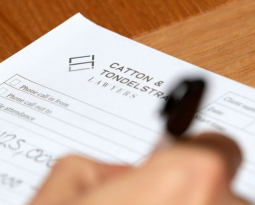Tips for your first appearance at Family Court
Appearing for the first time at Family Court can be extremely daunting. Regardless of whether you are representing yourself or assisted by a Solicitor, many people find themselves completely unfamiliar with the process of appearing in Family Court.
It is not uncommon to be questioning how you should dress for Court, where you should be sitting or whether you can bring a support person. Below are our tips for appearing in Family Court for the first time and a guide as to what you can expect.
What to do when you first get to Court
If you are represented on the day by a Solicitor, you will have likely already planned with them where you are to meet. If you are unrepresented, you should wait outside of the Courtroom in which your matter is listed, for the Judge’s Associate to appear. The Judge’s Associate will be wearing black robes and will be responsible for calling the matters throughout the day when they are ready to be heard.
At the commencement of the day, the Associate will usually call for all matters listed to come up and mark their name off with them, or tell all parties to enter into the Courtroom for what is referred to as a ‘callover’.
If you are represented by a Solicitor, then your Solicitor should attend to marking your name off with the Judge’s Associate and/or attending callover. This essentially informs the Court that you are in attendance and your Solicitor will provide some information as to, for example, whether there are ongoing negotiations and how long the matter is likely to take, so that the Judge or their Associate can plan the day appropriately.
When your matter is ready to be heard by the Judge, the Associate will either call you to the back or front of the Courtroom. If you are called to the back, this means you are to go into the Courtroom and sit in the gallery seats and wait for your matter to be called to the front. When, you are called to the front, you are to proceed to the bar table. If you are represented by a Solicitor, then your Solicitor will sit at the bar table and you will sit next to, or behind them, depending on the Courtroom.
Court Etiquette
When appearing in Court, there are certain expectations as to etiquette. Below are our tips for appearing in Court:
- Make sure you have dressed appropriately as if you were attending a corporate job interview. If possible, wear a suit jacket or blazer in the Courtroom and dress conservatively. The Court is often quite cool, and it is recommended you wear long-sleeved clothing.
- If the Judge is sitting, make sure you bow as you enter and leave the Courtroom. This is a sign of acknowledgement and respect.
- When you are waiting in the Courtroom for your matter to be called, make sure that you sit quietly and avoid talking or making any distractions.
- If you are self-represented, make sure that you address the Judge as ‘Your Honour’ and that you stand whenever the Judge is speaking to you, or you to the Judge. Ensure that you do not talk over the top of the Judge, or the other party.
- Do not wear hats or sunglasses on your head in Court. You will be asked to remove them by the Judge’s Associate.
- Make sure that you are not recording or taking pictures inside the Courthouse or Courtroom, as this is a criminal offense.
Who can attend at Court with you?
The majority of Family Court matters are heard in open Court, meaning that anyone over the age of eighteen (18) can attend at Court with you and sit in the gallery seats at the back of the Courtroom. They will not be able to sit at the bar table or speak on your behalf unless approved by the Court.
Some matters, however, may be heard in a closed Courtroom, if the Court determines this necessary. This is unlikely, however, on the first Court date. If for some reason your matter is to be heard in a closed Court, then you will not be able to bring any other person into the Courtroom with you, without the permission of the Court.
If it is likely that a relative or friend will be a witness for your case in the future, it is recommended that person does not enter the Court to view any of your appearances before the Court in order to avoid any later objection that their testimony has been modified as a result of what they may hear during the proceedings.







